-
RAVENS/KORPARNA (Jens Assur 2017)
JENS ASSUR: RAVENS/KORPARNA (2017)
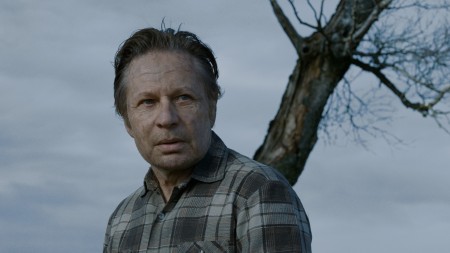
REINE BRYNOLFSSON IN RAVENS
The harsh demands of Swedish farm life
Just a typical rural Swedish farm in the Seventies, 1978, to be precise. In this film based on a novel by Tomas Bannerhed, the father, Agne (Reine Brynolfsson), finds his work a struggle. The early scenes of the film are completely wordless. Son Klas (Jacob Nordström), a bird watcher with pretty eyes, hangs (while he can) with Veronika (Saga Samuelsson), the new girl visiting from Stockholm, and has little interest in taking over the place. Gärd (Maria Heiskanen), wife and mother, tries to offer some warmth, but she gets hers sometimes from another man in town. The farm doesn't really belong to Agne, but he has little interest in local developers using a forest attached to the land, or even in adopting modern machinery, little interest in keeping the landowners pleased with him.
Jens Assur, whose feature debute as director-writer-producer this is, arrives as a photojournalist with a good eye: the starkness has an edge of beauty granted by the 35mm camerawork by dp Jonas Alarik. The drab grays have a glow of yellow and purple; the light often sings. And then there are those ravens, who cast interesting shadows across the barn wall. This is small compensation, against the doom-ridden score by Peter Von Poehl. The sound design is sometimes scary; so is the score. If you grew up on a Swedish farm, many seem to think, this will speak to you. Citizen critics on IMDb suggest Swedish farms atmospheres haven't changed so much in subsequent decades, only the size of the land and the machinery. If that's not your background, you may find Ravens a bit stingy in the story line, or just implausibly grim, though the wordless passages are interrupted, if only briefly, by exciting moments. This is Sweden, home of the mournful, and this film fits with local cinematic tradition. At least one of Klas's not-so-distant forebears has killed himself. What will happen to Klas? Or to Agne? Gradually, we find out.
When Agne does something creepy, you wonder if he is a monster or a villain? Stefan Dobroiu argues in Cineropa that, in the layered performance of the experienced Brynolfsson, he's a richly layered character, one of the year's most complex and compelling on film. At least he is not the simple grouch he may seem at first. Klas' idea of a great date night with Veronika is attending a slide lecture on scavenger birds (the speaker is entertaining). That's a droll thought. Ultimately however for some the longish run-time may feel stretched out, there is a sense of inevitability, and, curiously given the anguish, of resolution - and resignation.
Ravens/Koparna, 105 mins., debuted at Toronto Sept. 2017; four other festivals. Screened for this review as part of the San Francisco International Film Festival.
SFIFF SHOwTIMES:
Tuesday, April 10, 2018 at 9:00 p.m. at Roxie Theater
Thursday, April 12, 2018 at 3:15 p.m. at Roxie Theater
Tuesday, April 17, 2018 at 6:15 p.m. at Roxie Theater
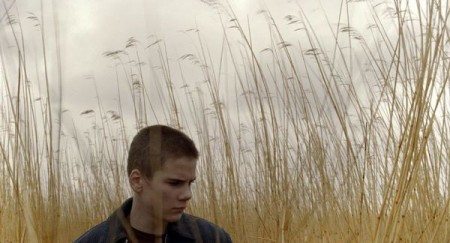
JACOB NORDSTROM IN RAVENS
Last edited by Chris Knipp; 04-11-2018 at 05:56 PM.
-
THE CLEANERS (Hans Block, Moritz Riesewieck 2018)
HANS BLACK, MORITZ RIESEWIECK: THE CLEANERS (2018)
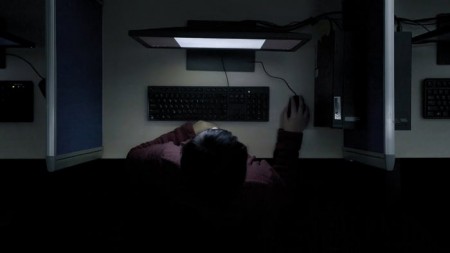
Social media are evil, is the true message of this little film
This documentary is more than it appears but much less than it should be. It's overburdened at only 85 minutes run-time. It has too much material to deal with, material that is new, complicated, and explosive. It starts out as "A look at the shadowy underworld of the Internet where questionable content is removed," as one summary states. This means the low-level employees, thousands, it is said, in the Philippines whose job is to "clean" the Internet, to view thousands of images that might be objectionable for people to look at and, on viewing them, to choose to allow or delete them. Actually the details of this work aren't really clear, and we don't get to see samples, but as - Nick Allen, Roger Ebert.com says in his review of this film, these "Cleaners" and this process are in themselves a complex subject that can't fully be dealt with in this film. This subject involves the plight of these employees whose work could be psychologically damaging. It also involves the way in which their decisions must be arbitrary, and in which they might not be able to judge taste or legality for viewers or users of other countries than their own country, the Philippines, and its culture. They make these decisions, incidentally, in a country governed by an insane leader known for his human rights violations.
But the film goes on to more important issues, which it can only begin to touch on. Primary among these is the pernicious effect of the social media, which so many users look upon as a boon. Google, Twitter, and Facebook - created in California by young white males - allow other countries like Turkey freely to censor what appears on social media in their regions. At the same time they allow the free flow of the most heinous material - misinformation, disinformation, hate. A prime example of that, cited in some small detail in the film, is the way Facebook has been used in Myanmar (former Burma) to foment hatred against the world's most oppressed minority, the predominantly Muslim Rohingyas who for centuries have lived in the Buddhist-majority country.
That's one example. On a wider scale, as a journalistic spokesman says earlier in the film, the social media have been creating the medium in which flows the politics that has produced Brexit and Trump - and no doubt the current general shift to the right and toward hate in world politics since Brexit and Trump. The "Cleaners" are not, in any political sense, cleaning, and they are certainly not clarifying. They are not filtering out false political claims or stupidity and hate, as the traditional world of good journalism we grew up with used to do. Nor are the powers that be in Silicon Valley doing so. Hate is good for business, it turns out. Nothing gets more hits in Myanmar than a vile attack on the Rohingyas.
A number of former employees of Google and Twitter appear as talking heads here expressing degrees of discomfort with what they did when in the fold and how the social media are operating now. Of course Mark Zuckerberg is in trouble for Facebook's lack of control of its myriad content. These things are Pandora's Boxes that have enveloped the world. Surely it would be idiotic for anybody now to say that Twitter, Google, or Facebook are forces for good in the world. They represent a marketplace that lacks the old checks and balances that kept discourse reasonable. Facebook is a major vehicle for the invasion of privacy. Good luck, Facebook users.
This is important material. But it's material for numerous documentary films, not one short one. The effect of The Cleaners is to give one the jitters. The material it only touches on is hard to pin down. It may leave you feeling like the unfortunate Filipino Internet filterers it starts out with, some of whom have committed suicide. This is a start, but we deserve better.
Having become convinced that an Apple cellphone salesman was a messianic guru making the world a better place, presumably it is easy for the public to start thinking a Harvard dropout who became an instant billionaire is a savior too. It is the opposite. The world of computers and the Internet has opened up humankind to vast stores of information - and vast new possibilities for stupidity and harm.
The Cleaners, 88 mins., debuted at Sundance Jan. 2018; also Rotterdam, DOX, and Hot Docs. It was screened for this review as part of the San Francisco International Film Festival.
SFIFF SHOWTIMES:
Sunday, April 8, 2018 at 7:00 p.m. at Creativity Theater
Wednesday, April 11, 2018 at 6:00 p.m. at Victoria Theatre
Saturday, April 14, 2018 at 8:00 p.m. at BAMPFA
Last edited by Chris Knipp; 04-10-2018 at 07:31 PM.
-
THE PUSHOUTS (Katie Galloway 2018)
KATIE GALLOWAY: THE PUSHOUTS (2018)
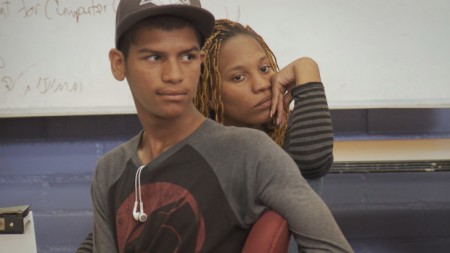
KIDS IN THE WATTS PROGRAM SHOWN IN THE PUSHOUTS
Giving back
Bay Area filmmaker and two-time Golden Gate Award winner Katie Galloway’s documentary The Pushouts focuses on a former West Oakland, California drug dealer and gang member called Victor Rios who has become a university professor and now seeks to redirect young people at risk after leaving high school without graduating. He calls them "pushouts" rather than "dropouts," because he feels they are forced out of school, rather than leaving by choice. Now a professor at UC Santa Barbara, with a wife seeking tenure and three kids, Rios and his mentor dedicate their lives to motivating young Mexican and African-American teens to realize their potential.
This little film has a lot of heart and contains touching footage of the present as well as some surprising moments on film of Victor Rios' earlier life when he was in school. There was a teacher called Ms. Russ who believed in the students others thought were going nowhere. A group of teachers negotiated a gang-based dispute Rios had while in school and that helped turn him around. During the film, he is asked to go to lead a session in the program called Yo! Watts! in Watts, California. This seems to lead to an "existential crisis" (his words) because he questions how he can help when he there for only a little while, and then goes back to his nice house and nice life in Santa Barbara.
But footage of the Watts program, designed to help pushed back young people open up in a place of trust about their pains and self-doubts, and regain confidence through training sessions in journaling, algebra, and rope climbing. The film shows these intimate and brave and touching activities. The message is that someone like Rios, who has "made it out" of ghetto life to be a smart person doing well, is uniquely qualified to help young people whom the system is trying to reject and cause to fail. He himself realizes he can do this, and so he keeps in touch with his own past. "We will not regret the past nor wish to shut the door on it," is Promise 3 in AA. It is an important message. This is a touching and enlightening little film.
The Pushouts, 56 mins., debuted at the Full Frame Documentary Film Festival in Durham, NC. It was screened for this review at the San Francisco International Film Festival, where it was shown in a free community screening.
Katie Galloway won the SFIFF Golden Gate Award for Bay Area Documentary Feature for The Return (2016). Her other films include Prison Town, USA (2007) and Better This World (SFIFF 2011), which won the GGA for Best Documentary Feature as well as the Writers Guild of America’s USA’s Best Documentary Screenplay prize.
SHOTIME, SFIFF:
Tuesday, April 10, 2018 at6:00 p.m. at Victoria Theatre
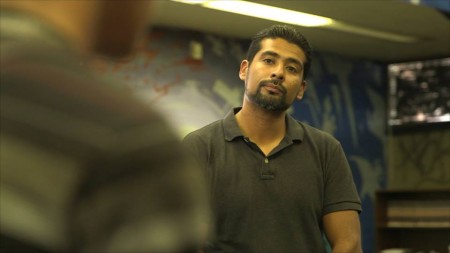
VICTOR RIOS IN THE PUSHOUTS
Last edited by Chris Knipp; 04-11-2018 at 11:12 PM.
-
I AM NOT A WITCH (Rungano Nyoni 2017)
RUNGANO NYONI: I AM NOT A WITCH (2017)
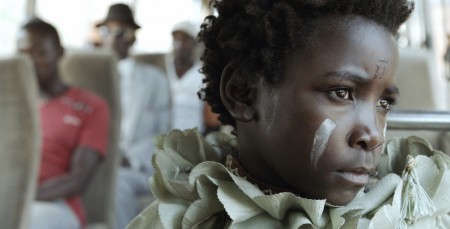
MARGARET MULUBWA IN I AM NOT A WITCH
Captive child
[CAPSULE REVIEW]
Witches attached to long white ribbons, and a girl who wishes she had chosen to be a goat. It was shot in Ghana and concerns Zambian stories of witches confined to limited spaces, centered upon a nine-year-old.. The director, a woman, was born in Zambia and raised partly in Wales. The film combines satire and surrealism and has a mercurially expressive young star, Margaret Mulubwa. It was shot by David Gallego, dp of Embrace of the Serpent. This feature film debut introduces a vibrant new talent with a distinctive vision.
I Am Not a Witch, 92 mins., debuted at Directors Fortnight at Cannes 2917, and has been shown in nearly 40 international film festivals. Screened for this review as part of the San Francisco International Film Festival, Apr. 2018. Film Movement will release it.
SHOWTIMES SFIFF:
Thursday, April 12, 2018 at 6:00 p.m. at Roxie Theater
Friday, April 13, 2018 at 8:15 p.m. at YBCA Screening Room
Saturday, April 14, 2018 at 5:30 p.m. at BAMPFA
Last edited by Chris Knipp; 04-19-2018 at 09:12 PM.
-
THE OTHER SIDE OF EVERYTHING (Mila Turajlić 2017)
MILA TURAJLIĆ: THE OTHER SIDE OF EVERYTHING/DRUGA STRANA SVEGA (2017)

SRBIJANKA IN THE OTHER SIDE OF EVERYTHING
Personal and political
The Serbian filmmaker Mila Turajlić had good reason to turn her camera on her mother, Srbijanka. And on their Belgrade apartment. Both are full of modern Slavic history. Back in the day, it was a handsome, spacious place. But one day many years ago, during the long rule of Marshall Tito, when Srbijanka was only a child, a woman in leather representing the communist party came, and divided it up. The Party thought the bourgeoisie was taking up too much space. Srbijanka is a big woman in slacks with cropped hair and glasses. She has a husky smoker's voice and a cigarette is rarely out of her hands. She speaks fluently, with good humor. She is the welcome and articulate spokesman of this professional "home movie."
During the Kingdom of Serbs, Croats and Slovenes, Mila's great-grandfather had settled his family into a space of about twenty-six-hundred feet. It was posh, and located on the second floor of a building in the same part in the middle of Balgrade as embassies, the Supreme Court, and the Ministry of Defense. roughly 2,600-square-foot space on the second floor of a building in a Central Belgrade neighborhood that was also home to the Ministry of Defense, the Supreme Court and foreign embassies. No wonder the communists didn't like this one family occupying so much space! The family knew when they were being observed from the other apartments by click sounds of spy holes.
They gave sections of the apartment to three or four other families that were sectioned off. This is the wall, these are the walls, that "everything" is on "the other side" of. The family managed to hold onto plans of the apartment, on which Srbijanka shows where the divisions were made. The remarkable thing is that the family remained in a central part of their apartment and remain there to this day. It still looks large. This is a family of dissidents. Srbijanka tells that her lawyer parents advised her not to go into the law to avoid being repressed. You're good at math, he said, so do that. And she married a married a professor of applied mathematics, studied electrical engineering and became a professor of physics. But she was still a dissident and she was still repressed. She want to Paris in '68 to participate in the student protests.
The university of Belgrade became a center for protests against Slobodan Milošević of which the Turajlić family and their apartment were a busy part. Mila weaves interviews with her mother and friends with archival films and photos to tell the story of the politics of the decades from Tito to today. Her mother was active in the Otpor! civic protest organization, and it becomes clear that she was a powerful orator, and speaks in public with authority even today. We get a glimpse of the time of Yugoslavia, and the events since, including the Serbian nationalism which Srbijanka, who has said it is her duty to remain in the country, is still vocal in opposing. An example of living history, this provides useful background on the Serbian civil war. Of course those on the other side won't approve, and there is a Citizen Review on IMDb that trashes this film. But it's an enjoyable film that will send those interested to the history books to fill in further background on Srbijanka's personal account.
The Other Side of Everything, 100 mins., debuted at Toronto Sept. 2017, receiving more attention at IDFA in Amsterdam - the VPRO IDFA Award for Best Feature-Length Documentary. In about a half dozen other festivals, with numerous Best Documentary nominations. Screened for this review as part of the San Francisco International Film Festival, where it is a nominee for the Golden Gate Award.
SFIFF SHOWTIMES:
Tuesday, April 10, 2018 at 6:30 p.m. at Roxie Theater
Wednesday, April 11, 2018 at 8:40 p.m. at BAMPFA
Thursday, April 12, 2018 at 12:45 p.m. at Creativity Theater
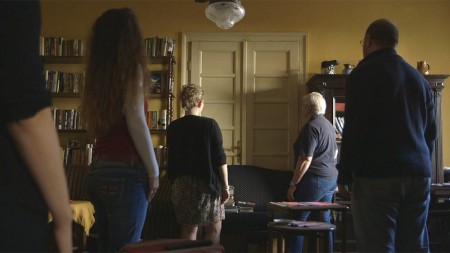
LOOKING AT "THE OTHER SIDE"
Last edited by Chris Knipp; 04-11-2018 at 08:00 PM.
-
WAJIB (Annemarie Jacir 2017)
ANNEMARIE JACIR: WAJIB (2017)
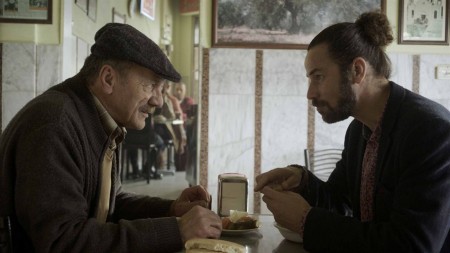
MOHAMMAD AND SALEH BAKRI IN WAJIB
Culture clash: Palestinian abroad vs. Palestinian at home
This film (whose title means "Duty" in Arabic) opened theatrically in France Feb. 2018 as Wajib: Invitation au mariage, receiving fair reviews (AlloCiné press rating 3.5). Libération (Marcos Uzal) said : "The film's strongest element is the marginal one, its way of suggesting by little touches the deepest and most profound tensions." Indeed. Thus the overheard Arabic radio news in the opening frames, as a Palestinian father and son, the protagonists, head off in a car, the old family Volvo, in which we learn later the son learned to drive.
"Following complaints," the speaker says, "the Ministry of Transport has agreed to remove Arabic announcements from public buses."Luckily for Mohammad and Saleh, they have their own transportation. Later an announcement comes of lumber shipments cut off from Gaza, barring reconstruction after the latest siege. All just routine. Sounds of the city, of Palestinian life, but nothing original, and a bit heavy-handed.
The son, it appears, is taking the wheel of his father's car. Evidently he hasn't seen him for a while, asking him if he still fishes, and if he's been smoking. There is a distance of information, and of understanding. And yet there is intimacy, the intensity of a close, cherished culture that Saleh knows well but lives outside of now. He can be an idealist. His girlfriend's father was a member of the PLO. He refuses to take an invitation to an Israeli official of the school where his father teaches, who he says is a government spy, and controls the school's life. But his father has to get on with the system - and says this man is a "pal." If he's going to become headmaster, he must invite Robbie. It's a "duty," in his sense - one of the many things that must be done to survive and preserve the cohesion of the local society and of his life.
But this is just the beginning. This is a picture of restrictive Palestinian society, and a clash of generations, especially when the younger one has lived abroad, in Europe. Saleh, in Italy now, is only there for the wedding of his sister Amal (Maria Zriek), and it's Christmastime. (Most of the local community seen is Christian.) They are going around, "the Nazareth way," delivering the invitations by hand one by one, so this becomes a very local road trip. His father is a teacher, and might be promoted to headmaster, but he reinforces conservative customs at every turn.
Everything that could go wrong does, but very quietly. They hit a dog, and Mohammad rushes away. It's dangerous not to, especially if it's an Israeli dog. They park in someone's way, and the car is vandalized, with a nasty note. Some drivers get into a street fight and Mohammad jumps out to stop it, and Saleh rescues him. The mood seems ugly. People are testy with each other. There's no solidarity. Surely there is not, here, the gentle humor of Elia Suleiman, the Jacqaues Tati or Jean Renoir of Palestinian Cinema. Jacir comes off as a more bitter chronicler, though, being a woman, also a more homely one.
It turns out Saleh's mother ran off years ago to another country, for another man, and that man is now dying, so she may not be able to come for the wedding - another humiliation for the family. It turns out the invitations have been misprinted, with the right date but wrong day of the week, and the printer refuses to reprint them. They must correct them all by hand.
To a certain extent this is about Saleh, and his discomfort becomes ours. He is the reactive one. And his reactions are almost continually, to various degrees, uncomfortable. There are things he misses, the food, the warmth, maybe even the language, but he could never really live here now. People want Saleh to come back and get married here and his father pretends to all they meet that this is a possibility. It's not going to happen, but they don't want to see that. This is part of Saleh's discomfort, that his point of view is simply not accepted or listened to. Even his look isn't acceptable. He has long hair tied back in a man bun, rose pants, and a pink shirt. He's a designer. Or is he an architect? But his father has told one relative, a doctor, that Saleh went into medicine, lying to please him with the thought that he was an influence, and still doesn't correct this lie. Anyway, nobody understands. Most assume Saleh has gone to America. One woman when he says it's Italy smiles and says, "Ah! You know languages!"
Now, there's a question if the wedding will even take place. Deep down Mohammad disapproves of it being in the winter and would like to postpone it till his wife's husband, who he detests unseen, dies, and till the summer, "when normal people get married." Well, things turn out alright, sort of.
The film's weakness and limitation is that it focuses on the clashes between father and son to the exclusion of much else. But these two actors, Mohammad and Saleh Bakri, who really are father and son, and these finicky details, ending in a grand argument between the two men, may be conventional and obvious, but still can be enlightening, and sometimes even heartbreaking. By defining the differences between a Palestinian who has stayed at home and one who has gone to live abroad, the film, written as well as directed by Annemarie Jacir, may define what Palestinian life is as well as any film you're likely to see.
واجب WAJIB 96 mins., debuted at Locarno 5 Aug. 2017, and was in at least 40 other international festivals in 2017 and 2018. It was screened for this review as part of the San Francisco International Film Festival, Apr. 2018. Pyramide International is the distributor. Full review posted 5 Aug. 2018, the one-year anniversary of the film's Locarno debut.
Last edited by Chris Knipp; 08-05-2018 at 01:18 AM.
-
GARY WINOGRAND: ALL THINGS ARE PHOTOGRAPHABLE (Sasha Waters Freyer 2018)
SASHA WATERS FREYER: GARY WINOGRAND: ALL THINGS ARE PHOTOGRAPHABLE (2018)
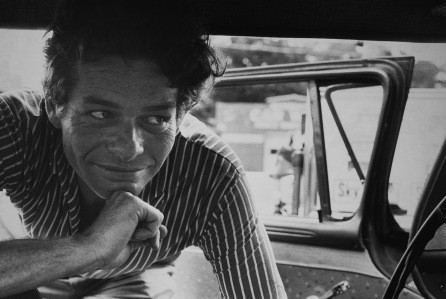
GARY WINOGRAND
American eye
[CAPSULE REVIEW]
Gary Winogrand was the preeminent New York "street photographer" of the years from midcentury to the Eighties. He was fast, prolific, and messy, and such is his extraordinary work. In this short film we get a sumptuous feast of his photographs (not necessarily organized to best show off their compositions and themes or to illustrate the best of them), with many opinions and recollections from gallerists, museum people, and a few (perhaps not enough) photographers, plus a couple of ex-wives. Not the best introduction, perhaps, but something, and long overdue, since he died in 1984, at 56.
Gary Winogrand: All Things Are Photographable, 87 mins., debuted at SxSW and won the Jury Prize there. Included in the US public TV American Masters series, it was screened for this review as part of the San Francisco International Film Festival.
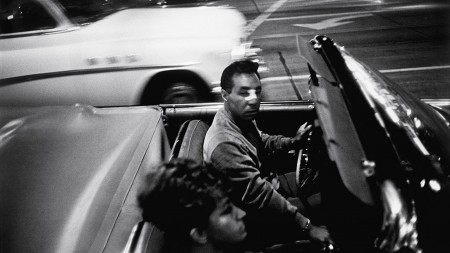
AN ICONIC PHOTO BY GARY WINOGRAND
SHOWTIMES SFIFF:
Saturday, April 14, 2018 at 8:00 p.m. at SFMOMA
AT RUSH
Sunday, April 15, 2018 at 1:00 p.m. at BAMPFA
AT RUSH
Last edited by Chris Knipp; 04-13-2018 at 01:20 PM.
 Posting Permissions
Posting Permissions
- You may not post new threads
- You may not post replies
- You may not post attachments
- You may not edit your posts
-
Forum Rules






 Reply With Quote
Reply With Quote









Bookmarks